KIZAD develops best-in-class warehousing and logistics ecosystem
KIZAD offers the right parameters for global logistics players to set up base in the UAE

Due to its multimodal connectivity and outward-looking vision, the UAE has evolved into the undisputed logistics hub of the region, resulting in steady economic growth.
KIZAD, the integrated trade, logistics, industrial free zone of Abu Dhabi, is driving this economic growth by developing an ecosystem with best-in-class connectivity and efficiencies.
KIZAD’s combination of quality soft and hard infrastructure, together with Khalifa Port, ensures industrial strength and transformation to attract global companies.
To date, KIZAD — part of Abu Dhabi Ports — has attracted major logistics players that include Agility Logistics, Al Mazroui International Cargo Company (MICCO), Schmidt Middle East and more recently, the Gulf Agency Company (GAC) and Sri Lanka-based Hayleys Advantis.
The successful combination of technology, infrastructure and connectivity positions KIZAD as an excellent base for manufacturing, trading and logistics industries across a host of sectors including metals, food processing, polymers, automotive, logistics, construction and more.

We are constantly working with our customers to help them reach their markets faster, cheaper and more efficiently.
Our customers operate here to serve the regional and global market, which includes Africa, the Indian subcontinent, the Middle East and CIS. Helping our partners become more efficient continues to be one of our key focus areas.
Port, road, air and future rail connectivity
Strengthening KIZAD’s value proposition for warehousing and logistics companies is its proximity to Khalifa Port, one of the fastest-growing ports in the world and Abu Dhabi’s strategic gateway to trade along China’s Belt and Road maritime route.
Through Khalifa Port, both COSCO and Mediterranean Shipping Company (MSC) — two of the world’s largest shipping enterprises — have chosen Abu Dhabi as a regional hub. This connects KIZAD to the strong growth of trade volume between Europe and Asia, contributing to regional container volumes that have grown at an annual rate of 6.4 per cent over the past ten years.
Adding to this connectivity is KIZAD’s proximity to four international airports, regional road networks and future GCC-wide rail, which link the zone to the steady growth of regional manufacturing activities.
KIZAD Logistics City
To further enhance KIZAD’s strategic advantage in the logistics sector, KIZAD Logistics City, launched earlier this year, offers industrial zone and free zone warehouses, which cater to trading, export, and third-party logistics companies, as well as freight forwarders and distributors. Also launched this year are pre-built light industrial units (LIUs) that serve light manufacturing businesses and workshops.
KIZAD helps traders, retailers, shippers and logistics companies quickly adapt to growth and fluctuating demand with its flexible warehouse solutions that are scalable to suit specialised and evolving business needs.
Digital infrastructure to streamline processes
Warehouse and logistics facilities need easy access to information regarding transactions, shipments and logistics to streamline processes and adapt their operations to market demand.
Maqta Gateway, an industry-wide and one-stop digital platform launched in 2017, connects maritime entities across the wider region and globe. The MASAHA mobile application developed by Maqta Gateway offers digital services for the KIZAD hinterland, enabling investors to access a wide range of information and services.
Abu Dhabi Ports is also the first UAE entity to test blockchain technology with maritime operator MSC — the project is being rolled out in phases and will be offered to freight forwarders and their customers. It will be extended to the rest of the trade community as a complementary tool to the Maqta Port Community System.
The array of KIZAD’s offerings and services enable warehousing and logistics companies to connect to the wider industry and scale up and manage costs. The successful combination of technology, infrastructure and connectivity positions KIZAD as an excellent base for manufacturing, trading and logistics industries across a host of sectors including metals, food processing, polymers, automotive, logistics, construction and more.



